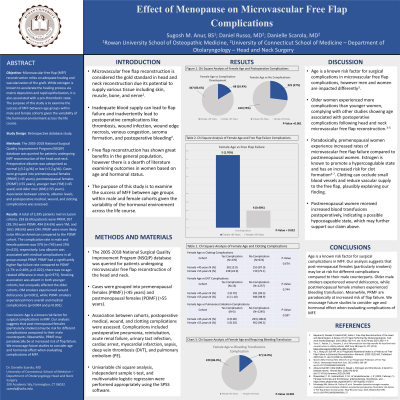Facial Plastic and Reconstructive Surgery
(157) Effect of Menopause on Microvascular Free Flap Complications
Monday, October 2, 2023
2:45 PM - 3:45 PM East Coast USA Time

- SA
Sugosh M. Anur, BS
Medical Student
Rowan University School of Osteopathic Medicine
Morris Plains, New Jersey, United States - DS
Danielle E. Scarola, MD
University of Connecticut School of Medicine, USA
Presenting Author(s)
Senior Author(s)
Disclosure(s):
Sugosh M. Anur, BS: No relevant relationships to disclose.
Introduction: Microvascular free flap (MFF) reconstruction relies on adequate healing and vascularization of the graft. Estrogen is known to accelerate the healing process via matrix deposition and rapid epithelization. Compared to premenopausal women, postmenopausal women have decreased collagen types I and III. We aim to assess how female hormone status affect complications after MFF.
Methods: The 2005-2018 National Surgical Quality Improvement Program (NSQIP) database was queried for patients undergoing MFF reconstruction of the head and neck. Preoperative albumin was categorized as normal (>3.2 g/dL) or low ( < 3.2 g/dL). Cases were grouped into premenopausal females (PRMF) ( < 45 years), postmenopausal females (POMF) (>55 years), younger men (YM) ( < 45 years) and older men (OM) (>55 years). Association between cohorts, albumin levels, and postoperative medical, wound, and clotting complications was assessed.
Results: A total of 3,395 patients met inclusion criteria. 293 (8.6%) patients were PRMF, 957 (28.1%) were POMF, 494 (14.6%) were YM, and 1651 (48.6%) were OM. PRMF were more likely to be African American compared to the POMF cohort. The complication rate in male and female patients was 37% (n=745) and 25% (n=415), respectively. Low albumin was associated with medical complications in all groups except PRMF. Interestingly, PRMF had a significantly higher flap failure rate compared to POMF (1.7% vs 0.40%, p=0.022); there was no age-related difference in men (p=0.973). Smoking association was absent in both younger cohorts, but unequally affected the older cohorts. OM smokers experienced wound dehiscence (p < 0.001), while POMF smokers experienced more overall and medical complications (p=0.004 and p< 0.001).
Conclusions: Age is a known risk factor for surgical complications in MFF. Our analysis suggests that post-menopausal females (particularly smokers) may be at risk for different complications compared to their male counterparts. Meanwhile, PRMF are paradoxically at increased risk of flap failure. We encourage future studies to consider age and hormonal effect when evaluating complications of MFF.
